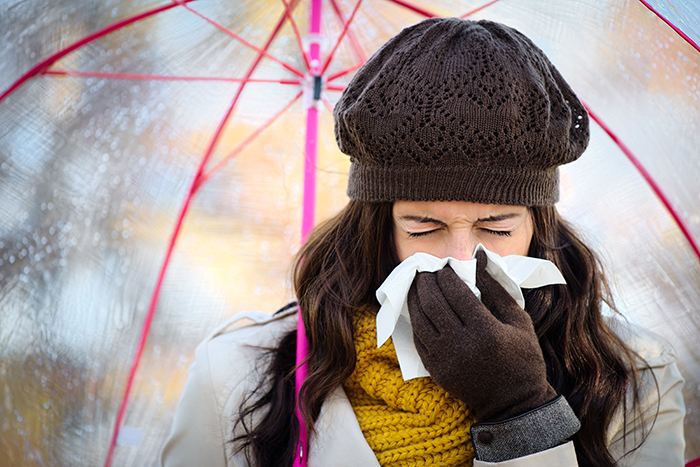Winter is well and truly on the way, and we all know what that means – colds and winter flu season!
Coughs, aches and a runny nose are synonymous with winter, but you can increase your chances of avoiding illness this year by taking some simple precautions.
How to can avoid catching a cold and winter flu
The easiest way to avoid catching a cold is to wash your hands regularly during the day. Hand hygiene is the first line of defence against a virus, and a thorough hand wash with soap and warm water the simplest way to fight the invaders.
If you don’t have soap, then hand sanitiser is handy to keep in your pocket or bag. Just make sure you use the alcohol version and not the antibacterial stuff. Over time bacteria and viruses can grow immune to this and create superbugs.
Of course prevention is better than cure, and everyone should be calling into their doctors for a flu shot before winter arrives. Unfortunately, because there are so many different types of winter flu virus, even a vaccination isn’t guaranteed to help.
Taking that into consideration, you should always try to stay away from sick people. It’s easier said than done, especially if someone at the office insists on coming to work when they’re sneezing and coughing over everybody.
If this is the case, try your best to avoid them. Move desks if possible, and make sure they dispose of their tissues before the virus gets a chance to float around the building infecting everyone.

Get plenty of sleep
We need plenty of sleep, even when we’re not fighting off a virus.
We all know sleep is essential to our mental and physical states, especially our immune system.
Researchers at Carnegie Mellon University found that people who recorded less than 7 hours of sleep a night were nearly 3 times more likely to catch a cold than those who clocked at least 8 hours.
Just that one extra hour in bed can make all the difference to your health and the odds of catching a cold!
Difference between a cold and winter flu virus
Picture it – you’re lying on your sofa feeling terrible. Runny nose, sore head, throaty cough. Suddenly a $20 note blows up against the window – do you get up to get it? If the answer is yes, you have a cold. If no, then you have the flu.
The symptoms of a cold and flu can overlap quite a bit, but one is significantly worse than the other.
An outbreak of influenza in 1918 killed upwards of one fifth of the world’s population, infecting approximately 500 million people, from the Arctic to remote Pacific islands.
During the outbreak, New Zealand lost about half as many people in the space of two months as it had in the entire First World War! No event has killed so many New Zealanders in such a short period of time.
The cold virus on the other hand is quite common, with the average person catching 2-4 colds per year. There are over 200 viruses which cause a cold, with the Human Rhinoviruses (HRV) causing around 40% of cases.
The easiest way to tell which one you have is by looking at the symptoms. With a simple cold, you’ll probably have a runny or stuffed nose, sore throat, tiredness and maybe some sneezing.
With a flu, you’ll have all those things, but also terrible muscle or body aches, a fever, headaches, vomiting and severe fatigue.
Myths about colds and winter flu
We all grow up knowing about colds and the flu, but unfortunately, much of what we learn isn’t true.
Many people will tell you to wrap up warm or else “you’ll catch a cold”. In reality the temperature has nothing to do with the cold, which is a virus. You’re more likely to catch it inside when in close proximity to other people.
It’s also a common misconception that your immune system needs to be weak in order to catch a cold. However, having a strong immune system should help you get better quicker, and thus shortening the duration of your cold.
Doctors tend to see a lot of patients turning up demanding antibiotics when they have a cold or flu-like symptoms. Unfortunately, these won’t help. Antibiotics fight bacteria, and the cause of the cold and flu is a virus.

How installing a heat pump can help
Around 35,000 people die each year from the flu and flu related complications. Serious conditions such as pneumonia and bronchitis can result from an infection, and the flu can also make chronic health problems, such as asthma worse.
Having a heat pump in your home can reduce the risk of contracting an airborne virus.
The circulation of fresh, clean air in the room is essential, especially for children, and many heat pumps today contain an advanced, multi-staged air filtration system.
Called the Plasma Quad Filter System, this air filtration system layers an anti-allergy enzyme filter with an electrostatic plasma field.
This system effectively removes four major air pollutants; bacteria, viruses, allergens and dust.
Keep your family nice and warm, and give them the best possible chance of a flu-free winter by installing a heat pump.
Contact us today if you have any questions, or check out our specials page for our latest offers.


